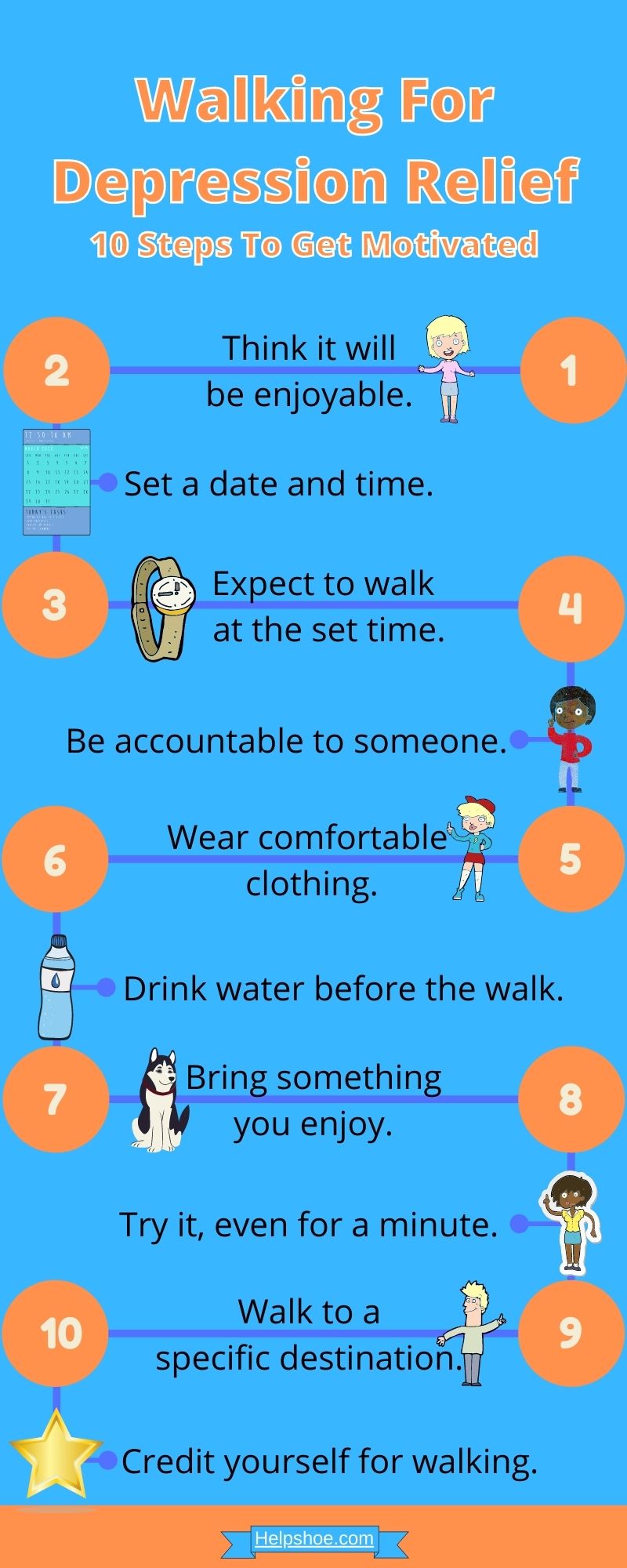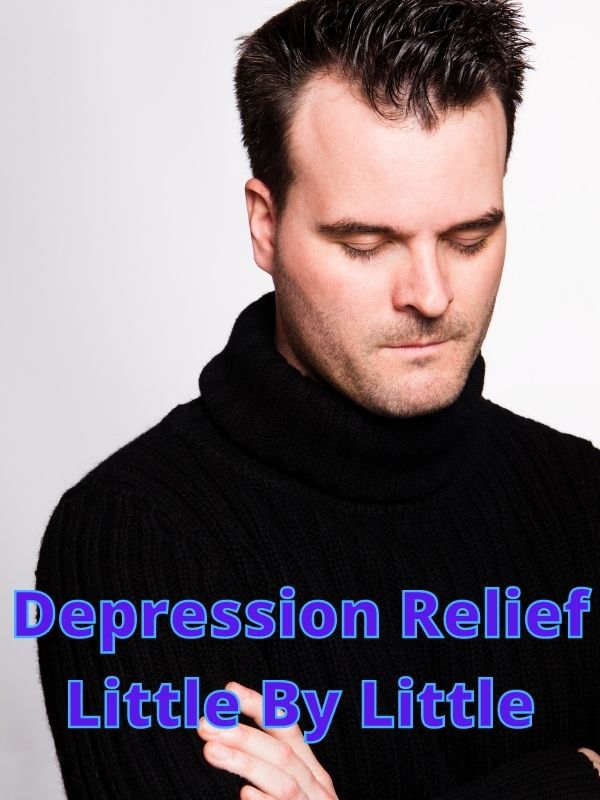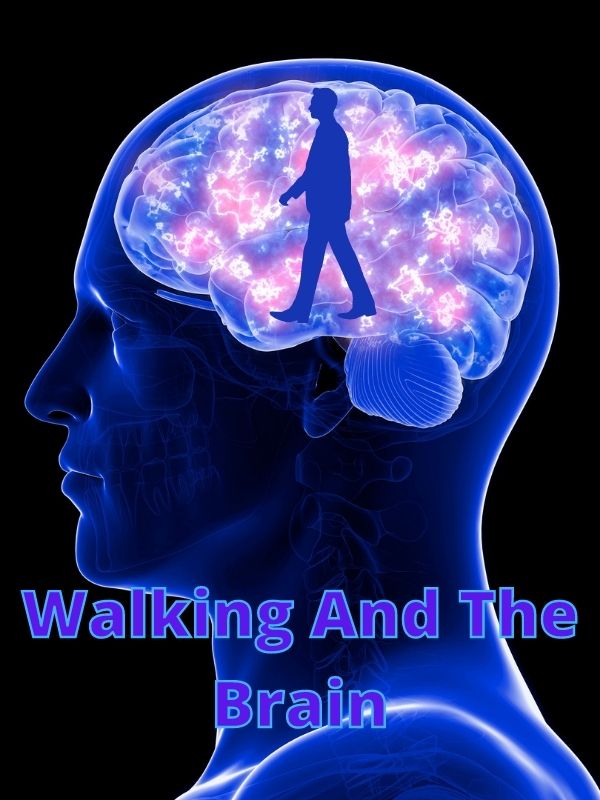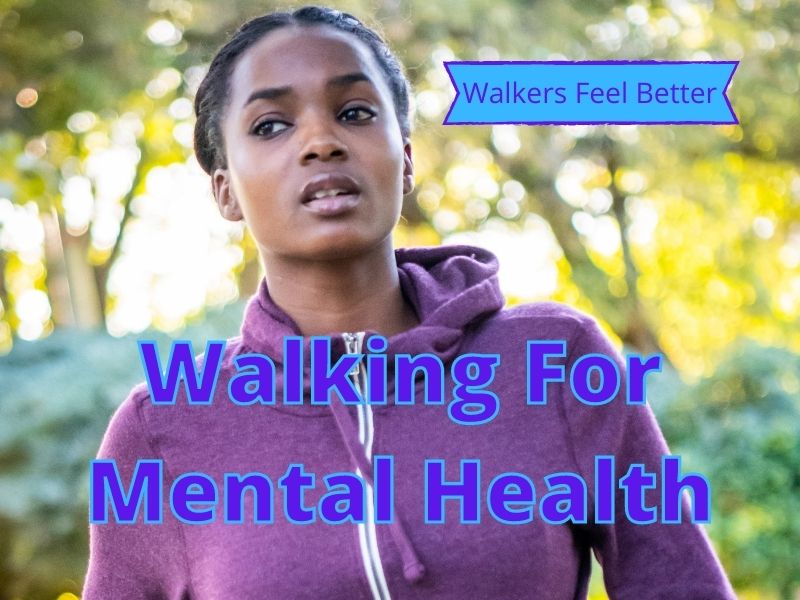Have you ever felt stressed, tired, and unable to make decisions? If you’ve felt like just getting out of bed is difficult, you’re not alone. It may be hard to describe when you’re feeling depressed, but to me, it feels like I’ve lost any drive to make a choice and I feel unhappy.
Walking is a great way to start to reduce the symptoms of depression. It can immediately begin to help some people feel better but often will take months for others to start to feel the full effects of depression relief.
I have come to feel the positive effect of what regular exercise can do. I also see what happens when I stop exercising for a while. In my life, exercise definitely makes a difference, and walking is one method I tried during one period of depression that helped.
Why Choose Walking To Relieve Depression

When I have felt unhappy or depressed, everything in my life was usually going well. Why am I feeling like this I would think; it was probably because the good feeling chemicals in my body were not available. We create different levels of chemicals based on genetics, diet, and exercise.
I knew that I needed to do something instead of just watching TV. I wanted to exercise, but I found that the mental effort required was significant. I found that walking was a choice that requires less effort to make.
I would choose a destination that was 15 minutes away and walk there. I would always listen to music or sometimes a podcast. Then, I would walk 15 minutes back, and by the time I got back home, I felt a little bit happier, sometimes much better.
My mood would elevate, and doing activities after my walk wasn’t so difficult anymore. My body needed to move and my brain was able to release the chemicals I needed to feel better.
While my experience shows what can happen for many people, there are also those who may not feel any sort of benefit from walking. They struggle to feel good even after walking for 30 minutes. Yet, many find relief if they are willing to sit it out over several months.
The great thing about the body is that it’s always changing, but it does take time. In one study, it took 4-6 months of walking for people to have a better night’s sleep. The brain takes time to change, so some people will find it months for their symptoms to improve.
Another study found that for older non-active adults, “walking for six months improved executive functioning, or the ability to plan and organize.” (discovermagazine.com)
It seems that the 6-month range is where a lot of studies find that changes with depression can have a significant effect. In a study of inactive post-menopausal women, it found that after walking for six months, they had a significant reduction in depression.
Each person has a different body and different levels of chemical production, but as I read various study results, walking always shows that it makes a statistically significant difference to help with depression most of the time.
Since walking may be an easier choice for some depressed people to make and walking has a high level of success among the various studies, it seems to me that choosing walking as a treatment for depression can be helpful for most people.
Remember to contact your doctor if you are experiencing depression. Some people think they can deal with it on their own, yet fail to do so. Getting medicine may help relieve symptoms and exercising and or walking can be one path toward depression relief over the long term.
How to Start Walking To Relieve Depression

Sometimes the best way to start is to make small efforts. When a task seems overwhelming, we may just try to avoid it altogether. Breaking the task down into easier steps can really make it feel much easier.
I noticed this occurred when I first went to the gym. I would have a need to gain a lot of mental effort in order to go consistently. Getting up, getting dressed, and driving to the gym wasn’t hard, so I didn’t need to spend mental effort on those things.
I thought about the feelings of effort and discomfort I would feel at the gym. This made the mental effort needed to go much more difficult.
Then I decided to make a commitment to just go, and I didn’t have to work out if I didn’t want to. This helped me get to the gym much more frequently. I didn’t put any pressure on myself, so I was able to exercise much more.
If your feeling bad, it takes effort to participate in many activities. Hopefully, these steps can help those who need the mental boost needed to start walking for depression relief.
Steps to begin walking to relieve depression:
- Get into the right frame of mind. Think of at least one reason you’re going to enjoy the walking experience.
- Set a date and time to go on your walk.
- Plan out your schedule so you will be doing at least one thing, at a set time, before your walk, so you have the expectation in your mind that the walk will be next.
- Tell someone else that you’re going for a walk and will let them know how it went later. You may want to get an accountability partner that is easy to talk to and is non-judgemental.
- Have the right shoes and clothing. It can be easy to make excuses that walking isn’t enjoyable if you’re not comfortable. Wear clothing that makes walking a more enjoyable experience.
- Drink 8oz of water before your walk. Drinking water can have a significant effect on energy levels, especially if you are chronically dehydrated like 75% of Americans. (dripdrop.com)
- If it is motivating for you, bring things you enjoy on your walk. Bring your music, a friend, a dog, and plan how you will be spending your time during your walk. If your out on a trail, you might want to bring your camera or binoculars.
- Convince yourself that you don’t have to complete the entire walk if it feels too hard at the time. Convince yourself that you do have to get dressed, go to where your walk starts, and begin walking, even if it’s only for a minute. Talking about your thought with someone may help.
- Start walking toward a set destination. Someone could just walk without choosing a place to go but that might lead you to a less enjoyable experience. Since there’s no destination some people may feel that their experience is controlling how they feel, instead of them controlling the experience.
- Finish your walk and give yourself credit for the walk. It can be as simple as a checkmark. You’re identifying that you did a healthy activity for your body and mind. This can help lead to further success in keeping a regular schedule of walking if you frame the achievement in the right way.
If you are able to do some of the steps mentioned above, you may find that the mental and physical effort needed to start walking becomes less.
Walking can begin to improve your physical health the moment you start, although the time it takes someone to begin to feel the relief of depression symptoms is different for each person. If you are walking 30 minutes a least 3 times a week, you might start feeling relief after a couple of weeks but it could take up to six months.
The more I learn about exercise in general, the more I recognize the need for our bodies to move each day for extended periods of time. The Department of Health and Human Services suggests 150 minutes of exercise each week because of how helpful it is for our bodies.
I know that for me it really makes a difference when I run for 30 minutes. And when I walk for 30 minutes, I may not have as much of a boost in energy as when I run, but I still feel enhancement to my mood similar to a run.
Recognize Depression and Start With Little Steps for Relief

I don’t know what chronic depression is like. There’s only been a couple of times where I’ve felt hopeless. I know during those times, I felt like nothing could make me happy. It wasn’t that anything was wrong in my life, it was that my chemical levels were way off.
This is when getting medical help is important, at least for the short term until you can establish some routines that help your body produce the chemicals it needs to feel at ease.
Genetics, diet, sleep, stress, and exercise all play a role in how chemicals are released in our bodies. We can start little by little, making a small effort to bring change.
We can be depressed for a number of reasons. Sometimes we are our own worst enemy, not realizing we’re working against ourselves.
For that reason, it’s important, to be honest with others about feelings of depression we are feeling. Talking to friends, family, physicians, and counselors can help us gain some perspective on what is going on.
We can begin to make changes after we realize what is happening. We can treat it as a health condition that needs our attention.
One change I found that helped me quite a bit when I was exercising was water. I would go to the gym and felt so out of energy. I had to put in a lot of extra mental effort to continue to exercise because I was dehydrated.
I didn’t realize I was dehydrated because I was drinking when I was thirsty, but one day I thought about how much water I had been drinking during the last 3-4 weeks. I was probably drinking about 1-2 16oz bottles of water each day, even with water I drank at the gym.
What I needed was about 7 bottles of water each day, according to a couple of water calculators I saw online. I was dehydrated. When I started drinking about 4 bottles a day I felt so much better at the gym like a weight had been lifted. And I started feeling differently too.
Little changes can make a difference in how we feel. A continuing series of little efforts will bring slow changes and may help with depression relief.
What Walking Does To The Brain

There’s a connection between the things we do and what happens in the brain. Our brain is always receiving signals from the body and responding to those signals.
In one study researchers found that “the foot’s impact during walking sends pressure waves through the arteries that significantly modify and can increase the supply of blood to the brain.” (sciencedaily.com)
This increase in blood supply can help deliver nutrients to your brain and possibly chemicals to your body. According to several articles I’ve read, endorphins are produced as a result of walking and these can have an immediate mood-lifting effect for many.
Disconnecting from the outside world can be easy when you feel depressed, but there are so many things signals that our brain can receive if we go out in nature or even on the sidewalk and walk. Another signal that our brain receives is from the sun.
I remember the time I spent building a garden for my school. I spent about 30-60 minutes each day outside in the partial sun each school day for a couple of weeks. I don’t think anything else changed, except more sunlight and working outside, but I started feeling happier than I had been for a while.
The sun helps us make vitamin D, which some articles say many people lack enough of. This vitamin can have a mood-enhancing effect. Doctors also warn against getting out in the sun too much because of skin cancer, but I was careful and for me, it seemed to be helpful.
Our brains can change. When we walk “at least 1 mile a day significantly enhanced the volume of several brain areas…” occurs. (ncbi.nlm.nih.gov) This article reported that one area of the brain that increased (frontal lobe) helps with our ability to think clearly about situations and solve problems better.
Changes in the brain seem to come through movement. It seems that sometimes, the connections between the brain and the body or even different parts of the brain sometimes are not strong. According to brainworldmagazine.com, we can train our brain through movement.
The article suggests that as we stimulate the brain (the nerve ganglia) it can help with connections to our body. I found out not too long ago that the stomach is one of the main places that releases feel-good chemicals in the body.
Science is still learning so much about how the brain connects to the body, there are many mysteries we still have yet to learn. Does walking strengthen our brain’s ability to connect to our stomach, so we can release more feel-good chemicals?
Mental Health Boosts By Walking

In addition to the relief of depression symptoms, walking can help people in a number of ways to feel better overall. When we walk changes in the body and brain occur.
The following are some mental health benefits that can occur when we walk.
- We receive strength to our bones and muscles by walking and this can help us prevent injury, feel relief from arthritis, and increase healing. We can feel self-esteem as we see our bodies change, and notice positive changes to our bodies.
- As we exercise (walking is considered light exercise) our body gets healthier and we heal, we feel less pain over time. What is really happening in the brain is that signals from the brain are not being sent to hurt areas because they are healed. Less pain means we have less mental stress.
- When we are on high alert, scared, or angry we begin to feel stress. Too much stress is harmful. Our body produces cortisol (the stress hormone) and this works with our brains to affect how we feel. Exercise is one way we can take back control of our feelings and receive some stress relief.
- If you are finding you can’t relax, walking can help. Whether you are anxious or feel tense, walking can help you feel more relaxed. You may need to walk a while if you have lots of energy, but after a while, your body will naturally want to rest and relax.
- Time to ourselves or time to mentally unwind can help us people get some mental clarity. Walking is sometimes a meditative process because we are focusing our attention on just one or two things, so we don’t need to focus on our worries.
- As I’ve stated in my article about walking to work, walking can help you feel less isolated. Getting out in the community can be very important for connecting with others. Walking with a friend on a regular basis can help you feel better when you aren’t well connected.
While walking isn’t a magic pill that will make everything better, it can produce change. The more we walk, the more the brain will change. Then, the brain will help the body to feel better, little by little.
A Healthy Mindset For Walking

Getting into a walking routine that you can manage is one of the best ways to continue to receive the benefits of walking. For me, that involves making my exercise about what I want to do, not what I have to do.
But before I even decide about what I want in a walking routine, I needed to believe in the idea of exercise. Exercise has been a part of my life since I was young and as an adult, I have learned so much about the health benefits of exercise.
Accepting exercise as an integral part of my life has been very helpful. Some people place a priority on exercise but for others, it isn’t.
Getting into an exercise frame of mind might come to you through inspirational books or videos, but if you never really feel like exercise is a part of who you are, you might not ever get into the habit of doing it consistently, no matter how important it is for your health.
For that reason, I suggest accepting exercise as a normal part of everyday life. That’s why I think it’s important to make it mentally easy to do, such as promising to do at least 1 minute of walking. Then you can progress from there.
In this article, you can find more ideas on how to get motivated to exercise. I don’t always feel motivated to exercise and sometimes I forget how important exercise is in general, but watching a video or two brings back that inner feeling that it is what I want in my life.
I hope that whatever exercise choices you make will start to benefit your life like they have mine. It took me a while to get to the point of wanting to exercise regularly, but now I feel like there’s something missing without it. I hope the same for you, that you can feel good about exercise and make it a part of your life and increase your body’s ability to relieve the symptoms of depression.
Thanks for visiting Helpshoe.com
References
https://www.discovermagazine.com/health/why-walking-might-be-one-of-the-best-exercises-for-health
https://pubmed.ncbi.nlm.nih.gov/25133492/
https://dripdrop.com/blogs/news/6-dehydration-facts-may-surprise
https://www.thecalculator.co/health/Water-Calculator-56.html
https://www.sciencedaily.com/releases/2017/04/170424141340.htm

